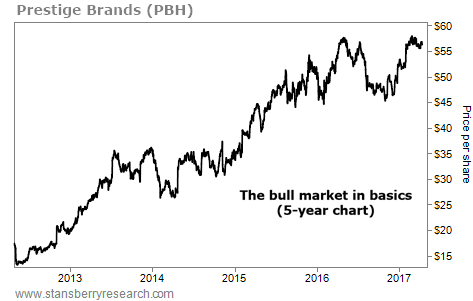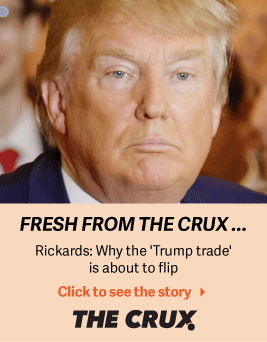| Home | About Us | Resources | Archive | Free Reports | Market Window |
Why Does Trump Say Dumb Things About China?By
Tuesday, April 18, 2017
President Donald Trump believes he's a great dealmaker... But is he?
His dealmaking with China looks amateurish...
"China's a currency manipulator!" he repeated relentlessly on the campaign trail – threatening the world's second-biggest country with sanctions.
He's wrong about this. Completely wrong. It shows his ignorance of global economics, and it makes the U.S. look bad.
Importantly, Trump finally conceded that China is not a currency manipulator this week – or at least that he won't call it one...
"Why would I call China a currency manipulator when they are working with us on the North Korean problem?" he Tweeted on Sunday.
But why did he call China a currency manipulator in the first place? Why would he keep repeating this lie for so long?
From the moment he won the election, Trump has been baselessly jabbing at China. I thought I'd explore why in today's DailyWealth...
I sat down with legendary Asia investors Peter and Tama Churchouse to get the perspective about Trump from their side of the globe, and to talk about the opportunity in Chinese stocks...
Peter has lived and worked in Asia for 35 years, and he headed Asia Research for Morgan Stanley when I was coming up. His son worked for JPMorgan. Together, they write Stansberry Churchouse Research's flagship investment newsletter, The Churchouse Letter.
I interviewed them in late January – but the insights they offered back then turned out to be dead on. Let me share with you some excerpts of our interview...
Steve: Trump immediately took a phone call from Taiwan's leader when he was elected. This angered China's leaders. So can you give us the significance of this from your perspective?
Peter Churchouse: I think it seems the president is trying to use Taiwan as a bargaining chip when it comes to trade negotiations and tariffs and exports and so on and so forth. I think that negotiating chip is going to go seriously flat. The simple reason is that Taiwan and China have a very, very close relationship these days in terms of economics and social contact.
The Taiwanese have invested massively in manufacturing capabilities in China. You have got hundreds and hundreds of thousands of Taiwanese living and working in China.
Now if Trump comes along and starts upsetting that balance, I don't think the Taiwanese are going to support him on any of this. They want the status quo to stay as it is. They don't want the status quo to be upset.
Steve: The Chinese want the status quo... The Taiwanese want the status quo... So Trump trying to use the "One China" policy as a bargaining chip is essentially useless?
Peter: I don't think it is going to be successful, if that's what the leadership in America think they are trying to do. There are other ways that are probably more productive to get China to come on board and deal with some of these issues that they may be concerned about.
Tama Churchouse: Yes. And also, let's bear in mind this looks like a typical Trump negotiating tactic... which is to come in with an extremely outlandish initiating position. The position he has tried to establish here is questioning the sovereignty of China over Taiwan.
That is not up for discussion by the Chinese. It is not a chip. It is not on the table. It is not there, and it won't work as leverage. As Peter said, the Taiwanese aren't even looking for Trump's support in this regard. So I think that conversation is going to be over quickly.
Steve: Let's move on to the currency. Trump says China is a currency manipulator. Can you comment on that?
Peter: Yeah, the currency-manipulation thing is a complete farce.
Steve: Are his advisers going to tell him this?
Peter: I have not heard his advisers actually mention this. When you talk about a currency manipulator, you are implying that country or that person is manipulating the currency downward. It's devaluing the currency. An actual fact of the last seven or eight years is the Chinese currency has gone UP against the U.S. dollar by something in the region of 20%.
Steve: What about compared with other major currencies?
Peter: It has gone up tremendously against sterling. And even more so against the euro. If you want to call China a manipulator, the country has manipulated the currency to the upside, not to the downside.
The Chinese government has spent about $500 billion to try and PREVENT the currency from going down. So China is doing exactly the opposite of what the Trump administration is accusing it of.
Steve: Our subscribers might think that if Trump is making all of these threats, China is less attractive as an investment. But I think Americans don't fully appreciate how drastically China has changed... Can you comment a bit on this big change?
Peter: Yes. Basically, the Chinese economy is moving to be much more of a consumer-driven economy. It has been historically export driven.
Tama: China is turning into a domestic-demand-driven consumer economy, and it has got the largest emerging middle class in the world. That is going to drive these stocks over the next decade.
Steve: Which of our four big themes in my True Wealth China Opportunities letter would you say you like the most at this moment?
Tama: I am definitely going to go with the consumer-technology theme, for sure.
Steve: So you are with me... that [my favorite Chinese stock] could be the world's largest company someday soon?
Tama: Yes, 100%.
So Peter and Tama believe Trump talked with Taiwan and called China a currency manipulator to use these things as bargaining chips. But there was no "Art of the Deal" here – China wasn't concerned about either of these things.
American investors have been fearful of investing in Chinese stocks – particularly when Trump started out with a combative tone on China.
That appears to be easing... as Trump wants China's help with North Korea.
As Trump tones down his rhetoric on China, American investors will get less worried about Chinese stocks.
As you might already know, I am extremely bullish on Chinese stocks, in all forms...
Buy China now, if you haven't already.
Good investing,
Steve
Further Reading:
"Finally, the big financial firms see the opportunity we've been writing about for months," Steve writes. The "big money" is coming to China. And that means it's time to get on board... before this opportunity disappears. Read more here: Morgan – and Now Goldman – Are Finally in My China Trade.
"With Donald Trump's rhetoric, most investors have given up on China," Steve explains. "That worry creates opportunity for us today... " Learn why these notable Chinese stocks could offer the best chance for hundreds-of-percent gains over the next five years, right here: Yet Another Great Opportunity That Nobody Is Talking About.
Market NotesTRIPLE-DIGIT GAINS IN THIS 'BASICS' WINNER Today, we're highlighting the power of everyday brands that dominate their markets...
We've looked at this strategy a lot over the years in DailyWealth because it works. We've shown you why investing in businesses that sell basic staples – everything from lumber to cleaning supplies to power tools – can be a winning strategy, even if it isn't "flashy" and exciting.
Prestige Brands (PBH) owns dozens of health and household cleaning products you probably have in your home without even realizing it. From eye care (Clear Eyes) and dental care (Efferdent) to household cleaners (Comet), Prestige Brands' products tend to have large market shares and are available everywhere, even at your corner store.
Prestige has enjoyed an impressive long-term uptrend. Shares have more than doubled over the last three years alone, and they've soared nearly 225% over the last five years. Cleaning products and eye drops may not be exciting, but it's clear that buying the basics works.
 |
Recent Articles
|



